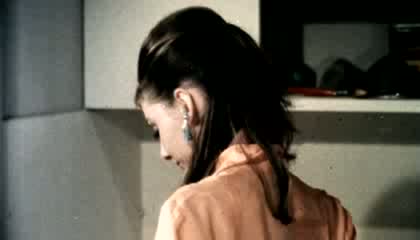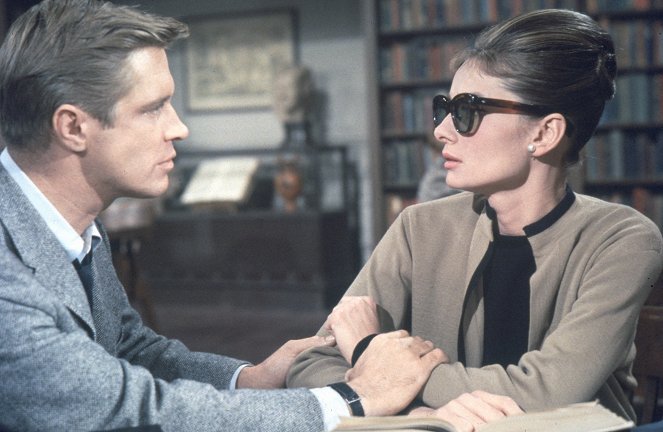Directed by:
Blake EdwardsScreenplay:
George AxelrodComposer:
Henry ManciniCast:
Audrey Hepburn, George Peppard, Patricia Neal, Buddy Ebsen, Martin Balsam, José Luis de Vilallonga, John McGiver, Stanley Adams, Elvia Allman, Alan Reed (more)VOD (4)
Plots(1)
Blake Edwards' screen adaptation of Truman Capote's novella stars Audrey Hepburn as Holly Golightly, an eccentric high-class escort working in New York. Rubbing shoulders with Hollywood agents and wealthy politicians at glamorous parties, Holly plans to marry into money and save up to help support her brother who is due to return from the army. However, when young writer Paul Varjack (George Peppard) - the kept man of a wealthy older woman - moves into Holly's apartment block, the pair soon find their worlds turned upside down. The cast also includes Patricia Neal, Buddy Ebsen and Martin Balsam. (Paramount Home Entertainment)
(more)Videos (1)
Reviews (8)
It’s really lucky that this movie was filmed back in 1961, therefore giving it the chance to become almost a cult Hollywood movie. In my opinion, it’s about nothing in particular and it’s interminably long. An hour would have been more than enough for the entire movie. In some places, Audrey Hepburn is so one-dimensional that she is thoroughly unconvincing. The movie plays at something it isn’t. It has just one bit of magic about it: the time and place it was filmed.
()
The great star of world cinema, Audrey Hepburn, was always greatly helped in her career by her fragile appearance, delicate face, and amazing eyes, which she skillfully used to hide the fact that she wasn't such a great actress. Besides the aforementioned advantages, her success also relied on the fact that she was able to choose roles wisely so as not to overexert herself. However, in her filmography, there are much more demanding films than Breakfast at Tiffany's, such as My Fair Lady, or films where she had to demonstrate much more acting talent, such as Wait Until Dark. In the case of her probably most famous film, Breakfast at Tiffany's, I always felt that the film served the viewer not so much with a story, but with Audrey and her charms. It's simply a one-girl show; otherwise, Breakfast at Tiffany's can be considered a mostly average romantic conversation film, which didn't make me laugh once and only slightly touched me in two or three places with its sentimentality. I wanted to give it three stars, but when I revisited the film for the third time, I fell asleep during it, and that shouldn't happen with a three-star film. Overall impression: 45%.
()
Breakfast at Tiffany’s embodies Hollywood at its most classic and at its worst. On the one hand, we have here the magnificently stellar Audrey Hepburn, a narrative with bittersweet tones and precision craftsmanship. On the other hand, there is the absolutely horribly kitschy ending that utterly negates everything that has gone before. All of the potential depth and ambiguity of not only the central character, but also of the whole depiction of the emptiness and artificiality of the American Cinderella story is bluntly trampled underfoot. At its core, or rather in the book on which it’s based, Breakfast at Tiffany’s is actually a precursor to Soderbergh’s The Girlfriend Experience, which the film version could also have been, up until that off-key climax. Only instead of the sense of detachment and cynicism of modern cinema, the bitterness and self-pity of consumer fairy tales shine through the cracks in the superficial carefreeness and the distracted life of the endless party. With a bit of tolerance and a great deal of sympathy, mainly for the iconic Audrey Hepburn, it’s possible to squint at the film and excuse its betrayal of the viewer in the same way that Mickey Rooney’s much-criticised part deservedly did, which unfortunately was the normal or rather dominant way of going about things at that time. Hollywood was overtly racist then, grinding down the edges of everything that stood out, returning distinctive and headstrong female characters, who were largely ground down themselves, into the arms of the masculine hero and delivering false illusions instead of inspiring catharsis.
()
The film version of Breakfast at Tiffany's carries with it certain expectations. Legend speaks of Audrey Hepburn, supposedly the ideal fashion icon, and of course Tiffany jewelry. But fortunately, there's something more important in there: Truman Capote, whose 1958 text, it turns out, is immortal. Unlike this loose film adaptation, which wasn’t very good. I admit that the brief scene of the denied date between Holly and Paul has some merit (especially the destruction of the New York Public Library property), but you can't build an entire film on that one idea. Everything is unnatural, and everything is artificial like the fake highlights Audrey wears in that insufferable bun. The pinnacle of all the sixties kitsch is, of course, the party scene, so typical of the chaos of many other Blake Edwards films. It simply doesn't make sense to set the story of 1943 anywhere else.
()
Recently, I bought the book "Breakfast at Tiffany's". I must admit that the movie "Capote" was responsible for it. I wanted to learn more about Capote not only from the movie about him but also from his own work. I have to say that the novella really intrigued me, so I had to watch the movie as well, which I successfully avoided for quite some time. In the end, I gave in and I did the right thing. First, the director's name caught me off guard. Blake Edwards? I had to make sure it was the same Blake who made the "Pink Panther" movies. It was the same one. I started the movie a bit uncertainly and immediately recognized that it was indeed the same person. Mr. Yunioshi is a classic Edwardian character, filling the "Pink Panther" films literally. By the way, Yunioshi is not played by an Asian actor at all, but by Mickey Rooney, whom you might know from the movie "Night at the Museum", to remember something more recent. However, this actor has already had over 320 film and television roles in his career. He is now ninety-two and still enjoys sufficient health to continue filming. But back to "Breakfast at Tiffany's". It is a memorable film, especially thanks to the character of Holly, beautifully portrayed by Audrey Hepburn. She is not the prototype of an American beauty, but that doesn't matter at all. The character suits Holly perfectly. The only difference compared to the original is that the book's Holly is less dumb. The movie version is somewhat idealized. The adaptation differs mainly in the ending, which is completely different. But this new, different ending works in the film. I don't want to say that it is better; I think it isn't. But the audience gets what they want. The book's ending would maybe be too open, and besides, Edwards and screenwriter Axelrod actually made the narrator, who is not even named in the book, the main character, although it should have been Holly in reality. For this reason, it was necessary to slightly modify the overall feel. But it's not bad. It's definitely not as terribly awkward as in the movie "Fear and Loathing in Las Vegas", for example. If I had to say something about the movie "Breakfast at Tiffany's", the best description would be "a nice film". More: http://www.filmovy-denik.cz/2012/12/motocyklove-deniky-proposition-v-zajeti.html
()



Ads